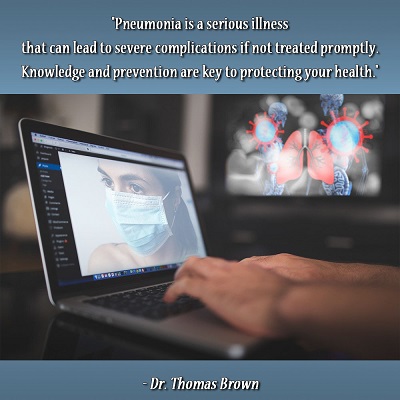 Pneumonia is a serious infection that can affect one or both of your lungs and is often caused by either bacteria, viruses, or fungi. This infection fills your air sacs with pus and other fluids, making it very hard to breathe.
Pneumonia is a serious infection that can affect one or both of your lungs and is often caused by either bacteria, viruses, or fungi. This infection fills your air sacs with pus and other fluids, making it very hard to breathe.
Since pneumonia can be life-threatening, it’s important to know the early signs so you don’t disregard them and can get medical help quickly. Catching it early means better treatment and a faster recovery, helping you get back on your feet. By understanding pneumonia and its complications, you can take better care of your lung health.
Three Types of Pneumonia
The three types of pneumonia are categorized based on what infection caused them, as mentioned above.
Bacterial Pneumonia
Bacterial pneumonia is the most common type and is caused by, you guessed it, bacteria. While anyone can get it, it tends to strike adults more often, especially if you have asthma or a weakened immune system.
If you smoke, drink too much alcohol, or have recently had surgery, your risk goes up. The same goes if you have heart disease or a respiratory condition.
Pneumonia is also contagious! That means you can catch it from an infected person’s cough or sneeze, or by breathing in bacteria-filled droplets. Knowing these risks can help you take steps to protect yourself and keep your lungs healthy and free from infection.
Viral Pneumonia
Viral pneumonia is caused by viruses like the flu, respiratory syncytial virus (RSV), or even COVID-19.
It’s more common in young children and older adults, who often have more vulnerable immune systems. Interestingly, viral pneumonia makes up about one-third of all pneumonia cases.
If you catch viral pneumonia, you should know that you’re also at a higher risk of developing bacterial pneumonia. This can happen because the viral infection can weaken your lungs and immune system, making it easier for bacteria to take hold.
Fungal Pneumonia
Fungal pneumonia is a less common type of pneumonia, typically caused by fungi like Histoplasma, which are often found in soil. When tiny particles or fungal spores are inhaled, they can enter your respiratory system and lead to infection.
Just so you know, this fungi isn’t found worldwide, so if you’re traveling or living in areas where these fungi are prevalent, it’s good to be aware of the risks and take precautions.
People with weakened immune systems are more susceptible to fungal pneumonia, so taking precautions and paying attention to any unusual respiratory symptoms can help catch it early. Taking care of your overall health and being mindful of your surroundings can help keep your lungs safe from this uncommon but serious condition.
Symptoms of Pneumonia
Pneumonia can make you feel really sick. Here are some of the symptoms.
- Cough with mucus that’s green or yellow, indicating an infection.
- High fever, chills, and sweating.
- Difficulty breathing, rapid breathing or shortness of breath.
- Chest pain when you breathe or cough.
- Fatigue and weakness.
- Nausea and vomiting.
- Bluish color to lips and fingernails, indicating a lack of oxygen.
- Confusion or delirium.
- Rapid pulse.
- Headaches and muscle pain.
What are the Complications of Pneumonia?
Pneumonia, although it is common, can sometimes lead to serious complications, especially if you’re already dealing with other health issues. One big concern is respiratory failure, where your lungs struggle to get enough oxygen into your blood or remove the carbon dioxide. It can make you feel incredibly short of breath, as if taking your next breath might not even happen, so it can be very scary!
Another complication is sepsis, which is like your body’s alarm system going haywire in response to the infection. It can cause widespread inflammation and affect how your organs work, potentially leading to very serious consequences if not treated promptly.
Sometimes pneumonia can lead to pleural effusion, where fluid builds up around your lungs, making it harder to breathe comfortably. In rare cases, it can cause things like lung abscesses, which are pockets of pus in your lung tissue. Pneumonia can also affect your heart rhythm or cause kidney problems.
Even after recovering from pneumonia, some people may still be suffering the effects, as they may might feel tired or find it harder to breathe for a while. Therefore, it is important to recognize the signs early, so complications don’t develop. Catching it early and getting proper treatment can really make a big difference in how quickly and smoothly you recover.
Prevention and Treatment of Pneumonia
You can protect yourself from pneumonia and other respiratory infections by practicing good hygiene and avoiding bad habits, yes, like cigarette smoking. You also need to keep your immune system strong so it can fight off the invaders when it needs to.
In terms of treatment, your doctor will determine your best course of action. Antibiotics are typically prescribed for bacterial pneumonia to target the specific bacteria causing the infection. Viral pneumonia, caused by viruses like the flu or COVID-19, can’t be treated with antibiotics and often resolves on its own with rest and care.
To manage your symptoms, staying hydrated is important, along with any other medications to help alleviate pain, reduce fever, and ease coughing. In some cases, oxygen therapy may be necessary to help maintain adequate oxygen levels in the blood.
Now you have a better understanding of the different types of pneumonia and its complications, plus what you can do to help prevent this lung infection. It is a common condition, but a serious one! So don’t dismiss any symptoms as an early diagnosis and appropriate treatment can ensure a smooth recovery.






